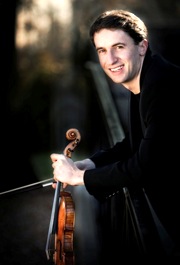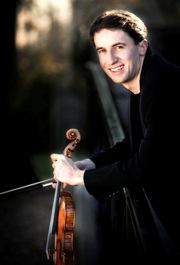
One of many joys of the 26th annual Jewish Music Festival, which runs March 5-13 in a variety of East Bay venues, is the opportunity to savor the multifaceted artistry of Noah Bendix-Balgley. The 26-year-old violinist is a rare bird who combines a blossoming career in classical music with a love for Jewish music and klezmer.
Bendix-Balgley owes his love of Jewish music and klezmer in part to his father, Erik Bendix, who has spent many years teaching Jewish and other folk dance traditions around the world, while pursuing a career as an Alexander Technique and body-mind therapy practitioner.
Thanks to the nudging of Ellie Shapiro, director of the Jewish Music Festival, Bendix-Balgley has spent the past year exploring the composers of the St. Petersburg Society for Jewish Folk Music.
Founded in 1908, the society strove to develop Jewish music “by collecting folksongs ... and supporting Jewish composers,” and to publish compositions and research on Jewish music. At the onset of the Russian Revolution in 1917, most of the leading members of the society left Russia, to continue their work individually in Berlin, Palestine, and the U.S. By bringing attention to their efforts, Bendix-Balgley has in effect become the youngest keeper of a grand tradition.
A finalist in the 2009 Queen Elisabeth Competition in Brussels, Bendix-Balgley won third prize and a special prize for creativity at the 2008 Long-Thibaud International Competition in Paris. He was also awarded first prize (and a special prize for best Bach interpretation) at the International Violin Competition “Andrea Postacchini” in Italy.
You grew up in North Carolina, but spent some time in the Bay Area, correct?
I lived out in the Bay Area with my parents for three years, in 1995–1997, when I was 10 to 13 years old. I attended the Crowden School, which is where I’ll give one of the concerts. It’s where I started playing chamber music, and also played in a chamber orchestra. It was a really nice environment, to be with other young musicians who were serious about classical music. It was difficult to find people like that, or instructors at that level, in North Carolina.
Listen To The Music
Der Heyser BulgarFeatured Video
Buy Tickets
Noah Bendix-Balgley
Venue: Crowden Music CenterCity: Berkeley
Date: Tue March 8, 2011 7:30pm
Price Range: $15-20
Are your parents deeply involved in music?
My parents are not musicians. My father is a folk dance teacher, among other things, so I had a lot of exposure to music when I was growing up, especially folk and klezmer. He’ll be teaching on the last night of the Jewish Music Festival, and teaches at festivals and workshops around the States and in Europe.
When my family was living in Berkeley, Ellie Shapiro saw my father perform, and got to know him. Partly through Erik, she got involved in Jewish music and dance. Ellie also saw me play klezmer music way back then, I believe.
I think the main part my parents played in my career was the opportunity they gave me to get a good education, both musically and more generally. They never put pressure on me to practice and to be successful with the violin; I had that desire and motivation myself. But they truly invested in my education, and gave me opportunities to study with the best teachers, and also get a well-rounded general education.
How old were you when the violin entered your life?
I started playing a little before I turned 5. It just started as something to do, but I liked it pretty much off the bat. By the time I was 8, I was pretty sure that I wanted to be a violinist.
Apparently, my favorite book when I was 4 was The Philharmonic Gets Dressed. It featured drawings and pictures of member of an orchestra all arriving at a concert hall, and getting all dressed up in their tuxedos. Because of the book, my parents thought I might be interested in playing the violin.
Were your violin teachers mainly classical?
Yes, that’s mostly what I’ve focused on. But because I was surrounded by the folk music my dad taught, as well as by a lot of classical music because it was always on the NPR radio station we listened to, I’ve also played klezmer music and some other folk traditions of European music since the age of 9. That’s something I’ve always enjoyed doing, in addition to classical music, which is why I’m looking forward to the concerts at the Jewish Music Festival. It will be an opportunity to combine those two traditions.
I learned klezmer violin mainly from other, nonclassical teachers at workshops in the summer or when my father was teaching. For me, it was an important aspect of my training, because I felt that the klezmer music, which is very improvisational and free, helped me play freer in my classical repertoire, which of course is a very prescribed tradition.
Please talk about your JMF program.
It’s basically classical compositions based in the Jewish tradition. Many are based on actual traditional Jewish or Yiddish pieces. The ideas of the St. Petersburg Society of Jewish Folk Music were based on the nationalistic musical traditions of the 19th century, such as Czech composers like Dvořák and Smetana, who incorporated traditional Czech music into their compositions, or the way Grieg, Rimsky-Korsakov, and Mussorgsky incorporated more folk elements into their compositions.
The pieces I’ll play are mostly short. Some are directly based on traditional Jewish tunes. Others are by composers who wanted to create a new Jewish style. I’ll also play a couple of Jewish-based pieces that are outside the tradition: the beautiful Baal Shem: Three Pictures From Hassidic Life by Ernest Bloch, who was a Swiss-Jewish composer from a little later [1923], and Maurice Ravel’s Kaddisch. But the main pieces are by members of the St. Petersburg Society of Jewish composers: Lazare Saminsky, Joseph Achron, Michail Gnessin, Alexander Krein, and Joel Engel. They’re not well-known, but their music is really beautiful.
When Ellie Shapiro of the Jewish Music Festival approached me the last year about the possibility of doing the concert, and mentioned to me the St. Petersburg school, I started learning the pieces. I chose the works I particularly liked — works that I feel I can say something with. I looked at perhaps 30 works, though most of them are quite short.
I’ll also play in the dance party at the end with some other festival artists. That will be straight klezmer music, when my father will be teaching. I don't get an opportunity to perform with my dad often.
You have a Web site and videos on YouTube. Do you get a lot of pressure to market yourself as a “package”?
No. But I don’t have a big manager who has an idea of what image I want to present. At the moment, I’m basically in charge of what I’m doing, so I have freedom to choose projects I find interesting, and learn music that I want to learn.
Your first recording is coming out?
It’s on a small French label, called Anima Records, that focuses on early-20th-century music. It will include Stravinsky, Prokofiev, Bloch, and Ravel. I record in the beginning of May. I chose the repertoire myself, because I felt they’re not pieces that are often played together.
I think of myself not so much as a flashy virtuoso throwing together a bunch of fireworks, so to say, but more as an introspective artist who puts things together after thinking about the music seriously. These pieces reflect that, and present a good picture of me as an artist.
What projects do you have coming up that especially interest you, other than this one?
There are dozens and dozens of pieces I can’t wait to start learning. And in continuation of the JMF program, I’d like to find some composers who would write pieces for me — ideally with orchestra — that combine the Jewish klezmer tradition with the classical tradition.

